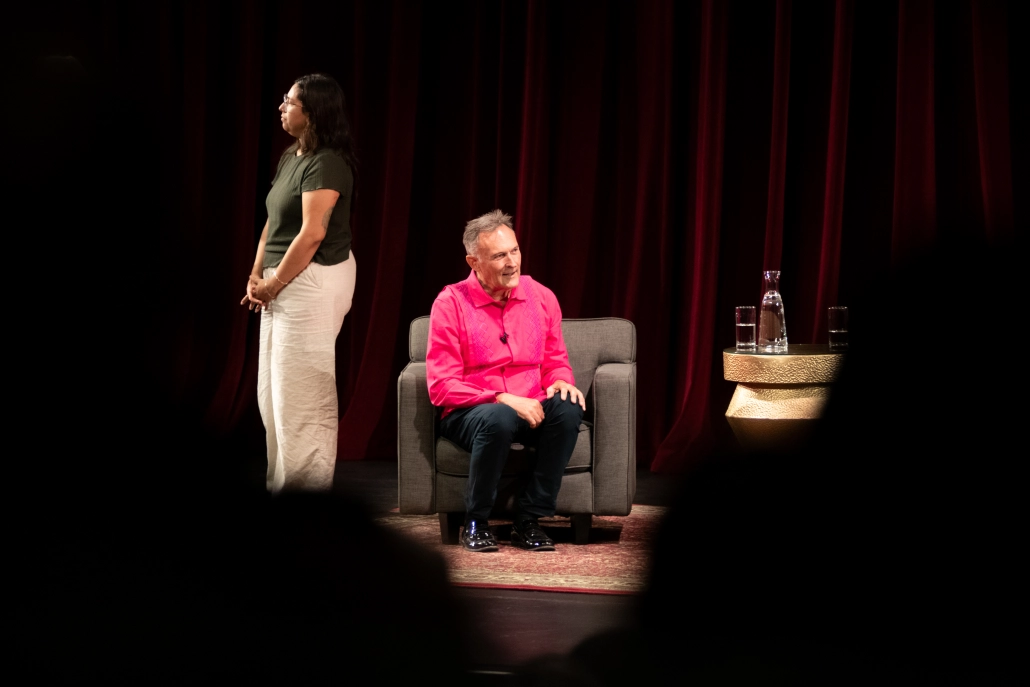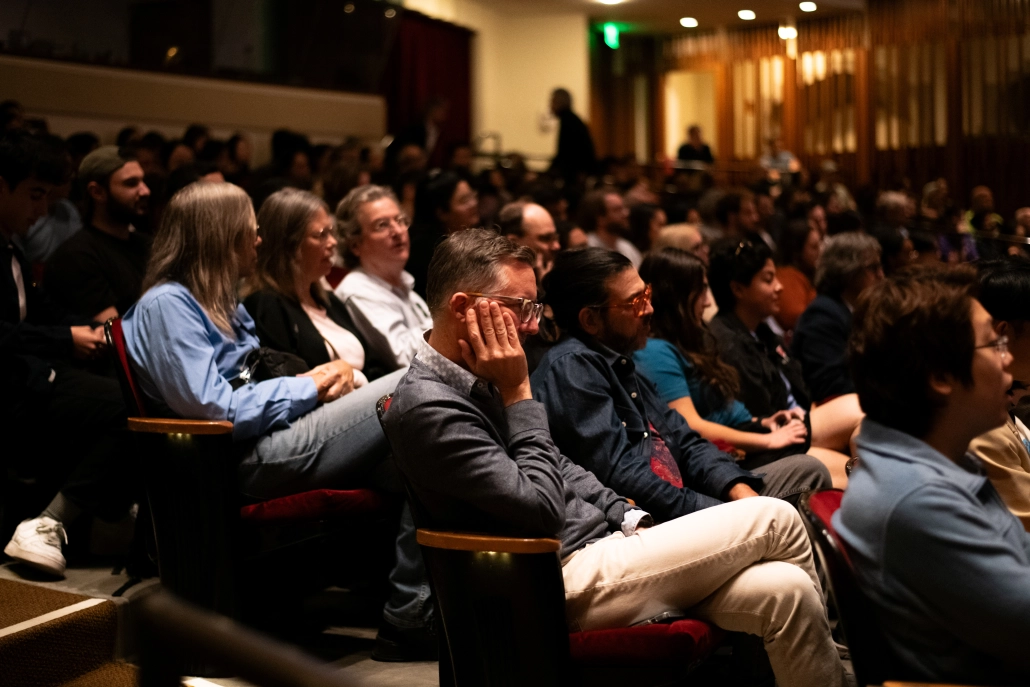Destroying boundaries with Mark Rios
The USC alum discussed his philosophies at a Visions and Voices event Monday.
The USC alum discussed his philosophies at a Visions and Voices event Monday.

An in-depth conversation with a professional architect like Mark Rios would be expected to cater to an audience of architecture students.
However, as Visions and Voices production specialist David Delgado puts it, “You don’t have to be an architect to enjoy this conversation.”
The event, hosted Monday evening at Bovard Auditorium, is the first in an annual speaker series created by Visions and Voices and the School of Architecture called “Crossing Design Borders.”
“[The School of Architecture] has created this series in hopes that they can not only celebrate the architects who are internationally acclaimed with roots here at USC,” Delgado said, “but also to identify the connecting fibers that can bring students, artists and thinkers together regardless of where they fall on their focus points or career paths.”
Over the course of the conversation, entitled “Boundless Curiosity: Unleashing the Potential of Inclusive Design Thinking,” Rios served as a glowing example of Delgado’s statements on the series’s broad appeal. A majority of the conversation, moderated by architectural journalist and part-time lecturer of architecture Frances Anderton, eschewed any technical talk about his team’s productions.
Instead, the USC alum honed in on the general philosophy behind his creations. The conversation focused on the titular idea of “inclusive design thinking” to explain how he and his architectural firm, RIOS, pushed back against convention to produce works like Los Angeles’ own Gloria Molina Grand Park.
Setting the table for the conversation itself, a brief presentation by Rios immediately highlighted the diverse nature of his firm. Rios smiled proudly as he noted the makeup of RIOS, which features 250 employees that speak over 28 languages and come from diverse fields such as communications and filmmaking.
This collection of minds, according to Rios, is reinforced in the design work RIOS creates, putting in the same work in projects ranging from “cups to cities.”
Anderton went out of her way to praise his work on both ends of the spectrum: “It’s a cliche, but they’re like the perfect cups. And the cities are good, too.”
Anderton began the conversation by asking Rios if he considered himself a modern-day “pirate,” citing the historical swashbucklers’ tendencies to get exclusive information from around the world. Rios didn’t push back on the allegations of architectural buccaneering, but made a key distinction about how the modern world works “through generosity” rather than walking the plank.
Rios spoke candidly and passionately about his belief in looking everywhere for inspiration, no matter the project.
“Hopefully, we’re all evolving our interests, want to challenge ourselves and want to ask good questions,” Rios said. “I think we’re all nerds, and that’s good.”

The event made clear that it’s integral to Rios to have varied perspectives in mind when designing a project. Rios opened by advocating for the audience to engage with people who challenge them to think differently about their work.
“We must always orchestrate our lives to be surrounded by others who encourage us to ask questions and think differently than we do,” Rios said.
During the conversation, Rios expressed how important this curation of perspectives was to him, despite the difficulty involved in making many voices heard.
“I think all of my colleagues would admit that it is a messy process, and democracy is slightly painful,” Rios said. “But what it does to you is hopefully produce a set of ideas that are a collection of different people’s ideas and thoughts and opinions.”
In response, Anderton brought up Rios’ personal background as a Mexican gay man as a possible driver for this commitment towards fostering perspective.
“My background, my last name, my parents being worried that I’m gay, and hiding that, [it] made me feel like I wasn’t a prime participant in society,” Rios said. “Those emotions compel me to make sure [I say] ‘Okay, I want to hear from that person.’”
Rios’ strong belief in embracing unique perspectives was later put to the test when one USC student asked him during the event’s Q&A session about RIOS’s involvement in the controversial Dodger Stadium gondola project. The proposed project has raised concerns over what the Los Angeles Times described as “accelerated gentrification” in Chinatown.
In response, Rios expressed regret at what he saw as a lack of public context, stating that he wished he could put up a “huge billboard” that explained how “before any of those designs were formalized, we met with each one of those communities and constituent groups.”
Once the event ended and the audience spilled out onto Alumni Park, conversations between the variety of USC students, alumni and faculty in attendance echoed the more general theorizing presented during the event itself. Rachel Wiggins, a junior majoring in architecture, stated that her primary takeaway from the event was to “stay curious” while designing.
“A lot of different people [have] a lot of different skills,” Wiggins said. “As an architect, I become more useful to myself and to a company if I know a little bit about each [one.]”
Wiggins hoped to find ways where, like Rios, her architectural work could cross paths with other industries. In particular, she hoped to connect her work to childcare after enjoying a babysitting job this summer. In other words, Wiggins did exactly what the event — and Mark Rios — encouraged her to do: cross design borders.
We are the only independent newspaper here at USC, run at every level by students. That means we aren’t tied down by any other interests but those of readers like you: the students, faculty, staff and South Central residents that together make up the USC community.
Independence is a double-edged sword: We have a unique lens into the University’s actions and policies, and can hold powerful figures accountable when others cannot. But that also means our budget is severely limited. We’re already spread thin as we compensate the writers, photographers, artists, designers and editors whose incredible work you see in our daily paper; as we work to revamp and expand our digital presence, we now have additional staff making podcasts, videos, webpages, our first ever magazine and social media content, who are at risk of being unable to receive the compensation they deserve.
We are therefore indebted to readers like you, who, by supporting us, help keep our paper daily (we are the only remaining college paper on the West Coast that prints every single weekday), independent, free and widely accessible.
Please consider supporting us. Even $1 goes a long way in supporting our work; if you are able, you can also support us with monthly, or even annual, donations. Thank you.
This site uses cookies. By continuing to browse the site, you are agreeing to our use of cookies.
Accept settingsDo Not AcceptWe may request cookies to be set on your device. We use cookies to let us know when you visit our websites, how you interact with us, to enrich your user experience, and to customize your relationship with our website.
Click on the different category headings to find out more. You can also change some of your preferences. Note that blocking some types of cookies may impact your experience on our websites and the services we are able to offer.
These cookies are strictly necessary to provide you with services available through our website and to use some of its features.
Because these cookies are strictly necessary to deliver the website, refusing them will have impact how our site functions. You always can block or delete cookies by changing your browser settings and force blocking all cookies on this website. But this will always prompt you to accept/refuse cookies when revisiting our site.
We fully respect if you want to refuse cookies but to avoid asking you again and again kindly allow us to store a cookie for that. You are free to opt out any time or opt in for other cookies to get a better experience. If you refuse cookies we will remove all set cookies in our domain.
We provide you with a list of stored cookies on your computer in our domain so you can check what we stored. Due to security reasons we are not able to show or modify cookies from other domains. You can check these in your browser security settings.
These cookies collect information that is used either in aggregate form to help us understand how our website is being used or how effective our marketing campaigns are, or to help us customize our website and application for you in order to enhance your experience.
If you do not want that we track your visit to our site you can disable tracking in your browser here:
We also use different external services like Google Webfonts, Google Maps, and external Video providers. Since these providers may collect personal data like your IP address we allow you to block them here. Please be aware that this might heavily reduce the functionality and appearance of our site. Changes will take effect once you reload the page.
Google Webfont Settings:
Google Map Settings:
Google reCaptcha Settings:
Vimeo and Youtube video embeds:
The following cookies are also needed - You can choose if you want to allow them:
